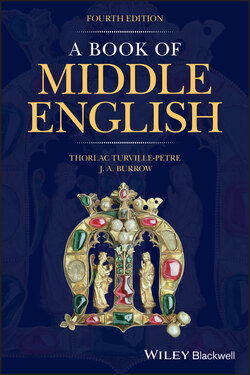Читать книгу A Book of Middle English - J. A. Burrow - Страница 31
4.2.4 Genitive Singular Without Ending
ОглавлениеThe genitive singular ending ‐e survives until the end of the period in nouns that were formerly of the feminine or weak declensions, as in fole hoves, ‘hooves of the horse’, 9/459, but it becomes increasingly rare. Gower has such genitive forms as herte, ladi, soule. The final ‐e is often dropped by later writers.
Nouns of relation ending in ‐er, such as doughter and moder, are quite commonly without ending in the genitive, as they were in Old English; examples are fader bone, ‘father’s murderer’, 11/243, fader brain, 13/170. Proper names in Northern texts often have no genitive inflection, as in Hengyst dawes, ‘Hengest’s days’, 11/8, Adam kynde, ‘Adam’s kindred’, 15/62; and note God hert, 18a/233.
